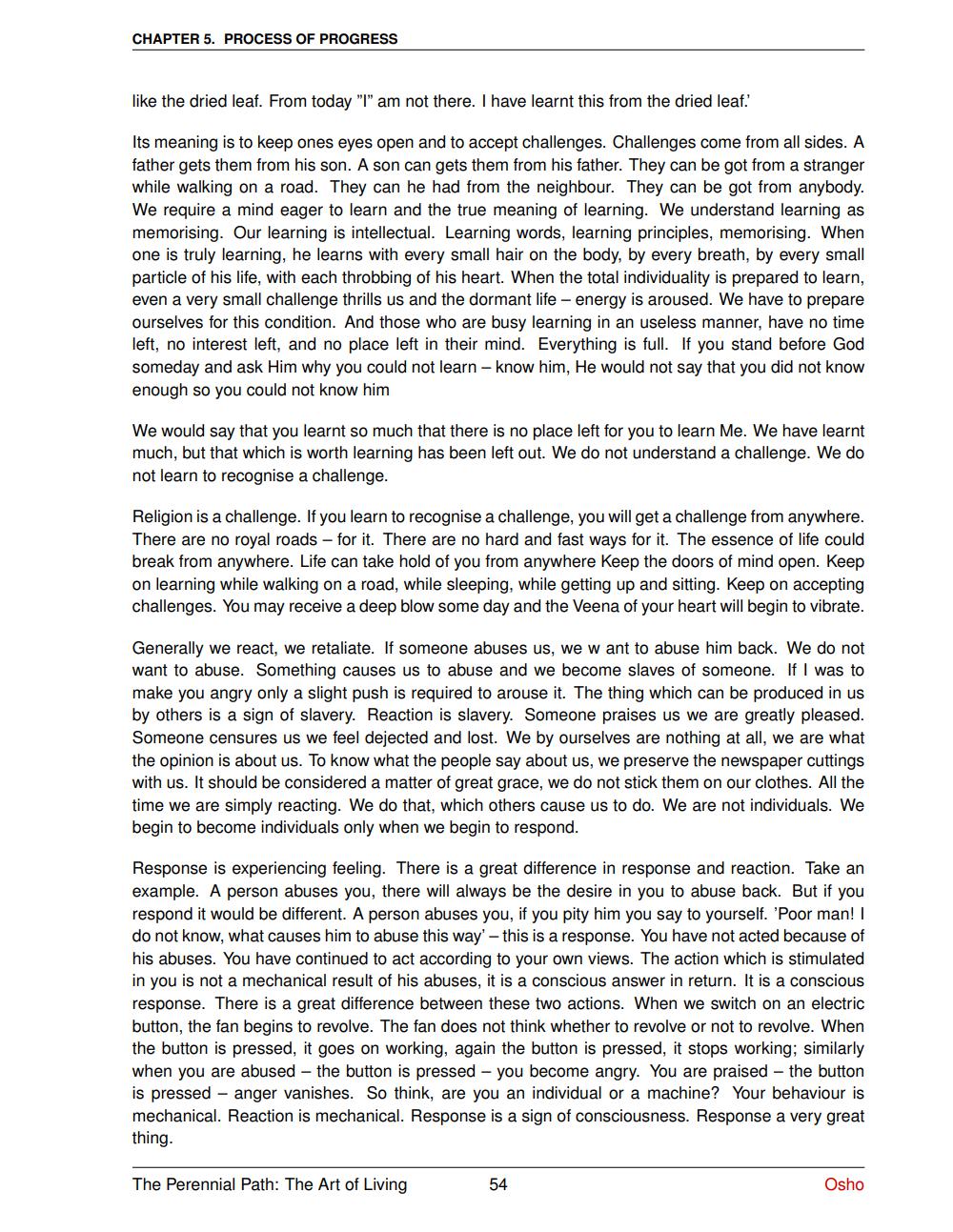________________
CHAPTER 5. PROCESS OF PROGRESS
like the dried leaf. From today "I" am not there. I have learnt this from the dried leaf.'
Its meaning is to keep ones eyes open and to accept challenges. Challenges come from all sides. A father gets them from his son. A son can gets them from his father. They can be got from a stranger while walking on a road. They can he had from the neighbour. They can be got from anybody. We require a mind eager to learn and the true meaning of learning. We understand learning as memorising. Our learning is intellectual. Learning words, learning principles, memorising. When one is truly learning, he learns with every small hair on the body, by every breath, by every small particle of his life, with each throbbing of his heart. When the total individuality is prepared to learn, even a very small challenge thrills us and the dormant life - energy is aroused. We have to prepare ourselves for this condition. And those who are busy learning in an useless manner, have no time left, no interest left, and no place left in their mind. Everything is full. If you stand before God someday and ask Him why you could not learn - know him, He would not say that you did not know enough so you could not know him
We would say that you learnt so much that there is no place left for you to learn Me. We have learnt much, but that which is worth learning has been left out. We do not understand a challenge. We do not learn to recognise a challenge.
Religion is a challenge. If you learn to recognise a challenge, you will get a challenge from anywhere. There are no royal roads - for it. There are no hard and fast ways for it. The essence of life could break from anywhere. Life can take hold of you from anywhere Keep the doors of mind open. Keep on learning while walking on a road, while sleeping, while getting up and sitting. Keep on accepting challenges. You may receive a deep blow some day and the Veena of your heart will begin to vibrate.
Generally we react, we retaliate. If someone abuses us, we want to abuse him back. We do not want to abuse. Something causes us to abuse and we become slaves of someone. If I was to make you angry only a slight push is required to arouse it. The thing which can be produced in us by others is a sign of slavery. Reaction is slavery. Someone praises us we are greatly pleased. Someone censures us we feel dejected and lost. We by ourselves are nothing at all, we are what the opinion is about us. To know what the people say about us, we preserve the newspaper cuttings with us. It should be considered a matter of great grace, we do not stick them on our clothes. All the time we are simply reacting. We do that, which others cause us to do. We are not individuals. We begin to become individuals only when we begin to respond.
Response is experiencing feeling. There is a great difference in response and reaction. Take an example. A person abuses you, there will always be the desire in you to abuse back. But if you respond it would be different. A person abuses you, if you pity him you say to yourself. 'Poor man! I do not know, what causes him to abuse this way' - this is a response. You have not acted because of his abuses. You have continued to act according to your own views. The action which is stimulated in you is not a mechanical result of his abuses, it is a conscious answer in return. It is a conscious response. There is a great difference between these two actions. When we switch on an electric button, the fan begins to revolve. The fan does not think whether to revolve or not to revolve. When the button is pressed, it goes on working, again the button is pressed, it stops working; similarly when you are abused - the button is pressed - you become angry. You are praised - the button is pressed - anger vanishes. So think, are you an individual or a machine? Your behaviour is mechanical. Reaction is mechanical. Response is a sign of consciousness. Response a very great thing.
The Perennial Path: The Art of Living
54
Osho




